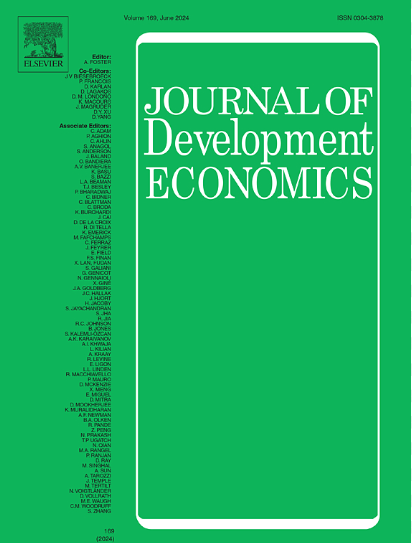大流行期间的社会保护和社交距离:加纳的移动汇款
IF 4.6
1区 经济学
Q1 ECONOMICS
引用次数: 0
摘要
在2019冠状病毒病大流行期间,我们对低收入的加纳人样本进行了随机移动汇款。接受治疗的家庭收到了8笔汇款,总额大约相当于一个月的收入,而对照组家庭只收到了1笔汇款。仅仅宣布即将到来的转会是没有效果的。一旦支付,转移支付会使同期食品支出增加8%,收入增加20%,但不会影响心理健康。超过40%的转移用于购买食品。我们发现了一些有启发性的证据,表明转移增加了社会距离。对收入的积极影响不会持续到最后一次转移后的两年,令人惊讶的是,对消费和心理健康的两年影响是负面的。我们共同了解到,大流行时期的现金转移支付可以在经济上支持家庭,而不会削弱对公共卫生协议的遵守,尽管长期影响是无效的或负面的。本文章由计算机程序翻译,如有差异,请以英文原文为准。
Social protection and social distancing during the pandemic: Mobile money transfers in Ghana
We randomized mobile money transfers to a sample of low-income Ghanaians during the COVID-19 pandemic. Treated households received eight transfers that sum to roughly one month’s income, while control households only received one transfer. The mere announcement of upcoming transfers has no effect. Once disbursed, transfers increase contemporaneous food expenditure by 8% and income by 20%, but do not affect psychological well-being. Over 40% of the transfers are spent on food. We find suggestive evidence that transfers increased social distancing. The positive effect on income does not persist to two years after the last transfer, and surprisingly, two-year effects on consumption and psychological well-being are negative. Together, we learn that pandemic-era cash transfers can support households economically without diminishing adherence to public health protocols, though with null or negative long-term effects.
求助全文
通过发布文献求助,成功后即可免费获取论文全文。
去求助
来源期刊

Journal of Development Economics
ECONOMICS-
CiteScore
8.30
自引率
4.00%
发文量
126
审稿时长
72 days
期刊介绍:
The Journal of Development Economics publishes papers relating to all aspects of economic development - from immediate policy concerns to structural problems of underdevelopment. The emphasis is on quantitative or analytical work, which is relevant as well as intellectually stimulating.
 求助内容:
求助内容: 应助结果提醒方式:
应助结果提醒方式:


